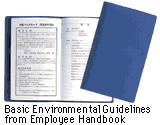Based on our management philosophy of “serving society through our business activities,” the Itoham Group has long endeavored to improve the safety and quality of our products while contributing to the development of new meal options and the wellbeing of society. Seeing interest in environmental issues such as global warming* grow on a global scale, we declared our commitment to doing business based on a management stance conscious of the need for constant efforts at environmental protection and harmonious coexistence with nature. The Basic Environmental Guidelines adopted in 1999 include a statement of our Basic Environmental Philosophy and Environmental Action Guidelines designed to guide the united efforts of all of us at Itoham Foods.
Management Philosophy
Company Policy
Serving society through our business activities.
Corporate Philosophy
Winning the confidence and trust of customers engenders belief in the safety and reliability of our products. The Itoham brand is founded on this reliability. By continually strengthening our brand and enhancing corporate value, we can make a meaningful contribution to society.This is our corporate mission.
Corporate Srance
- Carry out customer-centric business activities and enhance the company's ability to respond to changes in the operating environment.
- Create an energetic workplace that encourages people to take on challenges by rewarding individuals for skills and results.
Basic Environmental Guidelines
Basic Environmental Philosophy
Based on an awareness that environmental preservation on a global scale is an issue of the greatest importance for people everywhere, we will endeavor to consider the impact on the environment of our business activities and work continuously to preserve the natural environment and enable society to coexist with it.
Management Stance
- 1.We will promote the development of products and services in a manner that gives due consideration to environmental impact in all stages, from development through use and eventual disposal.
- 2.We will consider the effect of our operations on the environment and constantly endeavor to improve our environmental preservation efforts by setting environmental goals and targets, and regularly reevaluating them.
- 3.We will work to preserve the environment, scrupulously observing applicable environmental laws, regulations, ordinances, and agreements, and establishing management standards on our own initiative.
- 4.We will work toward the realization of a sustainable society* and strive to reduce the burden on the global environment by promoting efforts to reduce consumption of energyand resources; to lower output of waste, greenhouse gasses, and substances that damage the ozone layer*; and to recycle waste products.
- 5.External and internal audits will be carried out on a regular basis and strict management will be exercised by the company on its own initiative.
- 6.We will endeavor to foster an understanding among our employees of the Basic Environmental Guidelines and an improved consciousness of the importance of preserving the environment through environmental education both inside and outside the company as well as in-house publicity.
- 7.In our overseas business activities we will give due consideration to environmental preservation in the countries in which we operate.
- 8.We will disclose information on our Basic Environmental Guidelines, our environmental preservation efforts, and the results of such efforts in the company’s Environmental Report.

Terminology
Global warming
A phenomenon in which an increase in greenhouse gasses, such as carbon dioxide, methane, and chlorofluorocarbons, causes the Earth to become warmer and average temperatures to rise worldwide.
Terminology
Sustainable society
As an alternative to a society based on mass production, mass consumption, and mass disposal, in a sustainable society adverse impact on the natural world and the environment as a whole would be minimized through measures designed to reduce the volume of waste produced by giving top priority to the reuse and recycling of discarded items.
Terminology
Substances that damage the ozone layer
The layer of ozone (O3) within the stratosphere provides protection to living things on Earth by absorbing harmful ultraviolet radiation from the sun. Ultraviolet radiation can damage the cells of living creatures and trigger mutations in their genes. It has also been identified as a cause of skin cancer in humans. Chlorofluorocarbons damage the Earth’s ozone layer and have caused it to thin out to the point that an “ozone hole” has appeared above the South Pole.